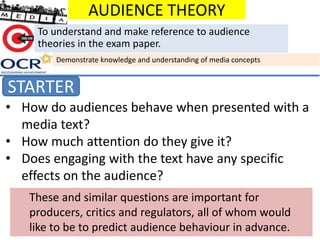
Audience theory
- 1. • How do audiences behave when presented with a media text? • How much attention do they give it? • Does engaging with the text have any specific effects on the audience? AUDIENCE THEORY STARTER To understand and make reference to audience theories in the exam paper. Demonstrate knowledge and understanding of media concepts These and similar questions are important for producers, critics and regulators, all of whom would like to be to predict audience behaviour in advance.
- 2. Try to remember your last encounter with each of the following media texts • A film seen at the cinema • A newspaper • A magazine • A video game • A radio programme • A television programme 1. How much effort did you have to put in to gain access to each text? Did you have to pay for it, make a special journey...? 2. How much knowledge about each text did you have before you approached it? 3. How much do you remember about each text – do you think you have changed in any way as a result of watching/listening/reading it?
- 3. PASSIVE AUDIENCE ACTIVE AUDIENCE Early theorists (1920s) tended to see audiences as passive, ie. Sitting back, waiting to be entertained or educated, and then following the direction the text suggested. The active model of behaviour takes the process of reading media texts to be more about engagement, with audiences seeking ‘to do something’ with whatever is presented to them. The uses and gratification model suggests that audiences find different needs satisfied by different types of media texts.
- 4. The effects/hypodermic model • Original model for audience • Stressed the effect of mass media on their audiences • Follows the idea that audiences are injected with ideas and meanings • Associated with propaganda (eg.Nazi films such as Triumph of the Will) https://www.youtube.com/watch?v=v6WMXd8ZqmM • Associated with totalitarian states and dictatorships who have complete control of the media, usually in the belief that strict regulation of the media will help in controlling entire populations
- 5. The Frankfurt School • The Frankfurt School (ie. School of thought) developed in pre-war Germany. • Concerned about the power of the mass media had to propagandise on behalf of Facism. • The Frankfurt School were left-wing and under threat in Germany. • They moved to America and refined their theories in post-war America. • They articulated criticisms of a capitalist system which controlled media output, creating a stupifying mass culture – a passive audience. • The American audience passively accepted the ‘American Dream’ of boundless consumption.
- 6. Media influence over morals https://www.youtube.com/watch?v=hZkC_fNxm Qk • Watch the following clips and try to identify some of the issues concerning the power and influence of the media.
- 7. Cultivation Theory • As audiences watch more and more film and television, they gradually develop certain views about the world, some of which are ‘false’. https://www.youtube.com/watch?v=Vw9DsOA1 Y-w
- 8. Desensitisation • If we are exposed to too much violence, or too much blatant sexuality, we will become less sensitive to real violence and sexuality.
- 9. Copycat theory • This approach suggests that people will imitate what they see in the media – eg. If young people watch Natural Born Killers they will go on a killing spree. • This is not so much a theory as an assumption perpetuated by the press
- 10. Reception Analysis and Ethnography • Audiences are seen as active producers of meaning, rather than as merely consumers of media meanings. • They make sense of media texts according to their social position (in terms of their identity) and their gender, race, class etc. https://www.youtube.com/watch?v=gJd1rkDoU RA
- 11. Uses and Gratification • Instead of researching what the media do to the audience, this approach studies what the audience does with the media. • This approach also takes account of people’s personalities and personal needs and suggests that audience’s find different needs satisfied by different texts. Cognitive – the desire to learn Audiences gain knowledge and think through problems or new ideas - make- over programmes, interior decoration Affective – emotional satisfaction Feel good films induce a sense of well- being Tension Release – relaxation Action films provide visceral excitement, comedies provoke laughter Personal integrative – help with personal identity issues We identify with characters who face similar problems to ourselves Social integrative – help with general issues in society Audiences ‘work through’ arguments about a social issue (safe in the knowledge that this does not face them)
- 12. Apply the Uses and Gratification theory • Apply the theory to soap operas • What do fans of soap operas claim it does for them? (Refer to specific examples and audiences needs) – The uses and gratification model appears to ‘empower’ the audience, but if you check through the list of audience needs again you’ll notice that they are primarily about accepting the original intentions of the producers. Do audiences really use the media like this?